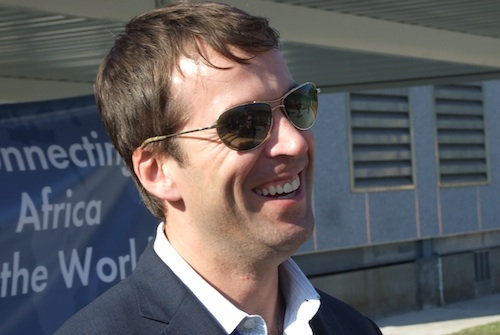
Seacom may soon cut international bandwidth prices. The cable operator’s first anniversary this month marks the end of price-cutting restrictions placed on it by some of its anchor tenants.
Brian Herlihy, Seacom’s president, says the agreement with anchor tenants — other telecommunications companies — ends on the anniversary of Seacom’s launch on 23 July.
“We had covenants that prevented us from dropping prices below a certain point,” he tells TechCentral in an exclusive interview. “In a way we created our own competition, but you have to do that to get guys [to invest] initially.”
Herlihy says Seacom’s bandwidth prices will come under pressure. “We are aware there is competition out there that we need to meet or beat.”
His comments come just a month before the expected commercial launch of a rival cable project, the East Africa Submarine System (Eassy). Eassy runs along a similar but shorter route to Seacom’s cable.
There are also new cable systems under construction along Africa’s west coast, where the high-capacity West African Cable System and the Africa Coast to Europe cables are both expected to come on-stream next year.
On Eassy, Herlihy says Seacom has first-mover advantage on Africa’s east coast. “It will put more pressure on pricing, but we’ve already faced that with the Teams cable in Kenya.”
Seacom will also collaborate with Eassy and provide options for companies looking for redundancy along the east coast. The two are already holding talks, Herlihy says.
He says Seacom wants to offer broader solutions so that it doesn’t have to compete on price alone. “Take our relationship with MWeb,” he says. “It wasn’t just about a purchase of bandwidth. Rather, it was a whole bundle of different things we could do to meet their requirements.”
MWeb recently launched SA’s first relatively affordable uncapped broadband products using Seacom bandwidth.
“Because we are rolling out our own carrier-class [Internet Protocol] network, we are in a position to be very aggressive in what we can do for people,” Herlihy says. “It’s a completely different discussion than the price of bandwidth.”
One area where Seacom wants to focus is in content. Herlihy says the company is keen to find ways of collaborating with media companies who want to distribute their content across the continent.
“For us, it’s about asking how we can become a distribution mechanism for content to more points of presence in Africa and how we can make that content more available and more widespread,” he says. — Duncan McLeod, TechCentral
- Subscribe to our free daily newsletter
- Follow us on Twitter or on Facebook




